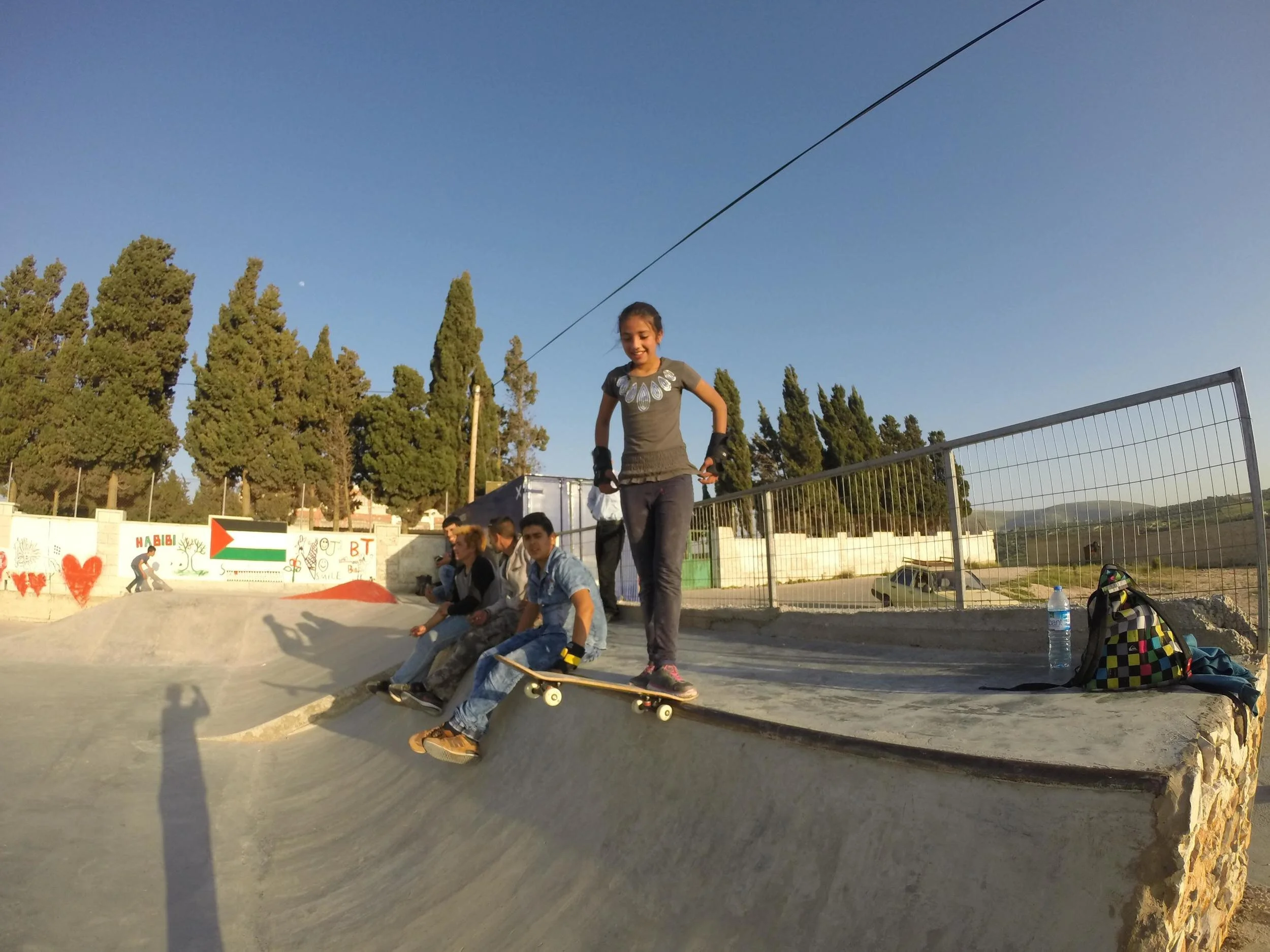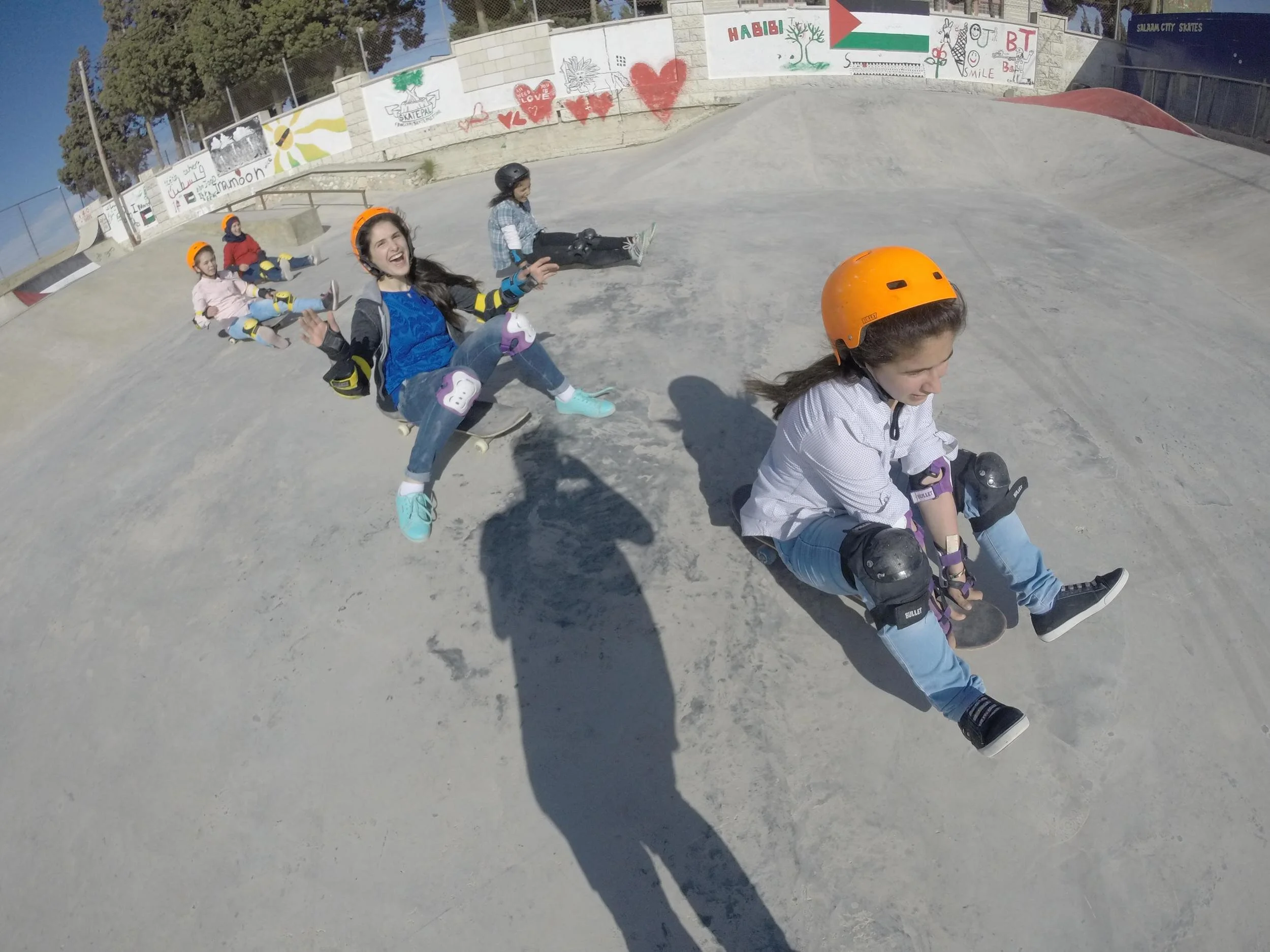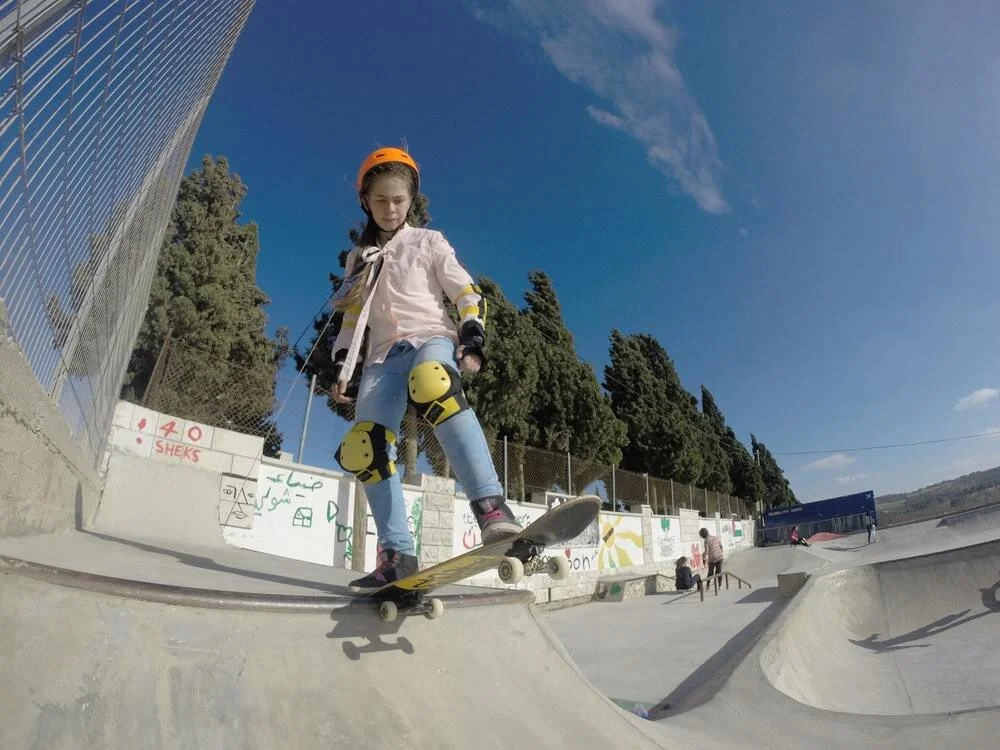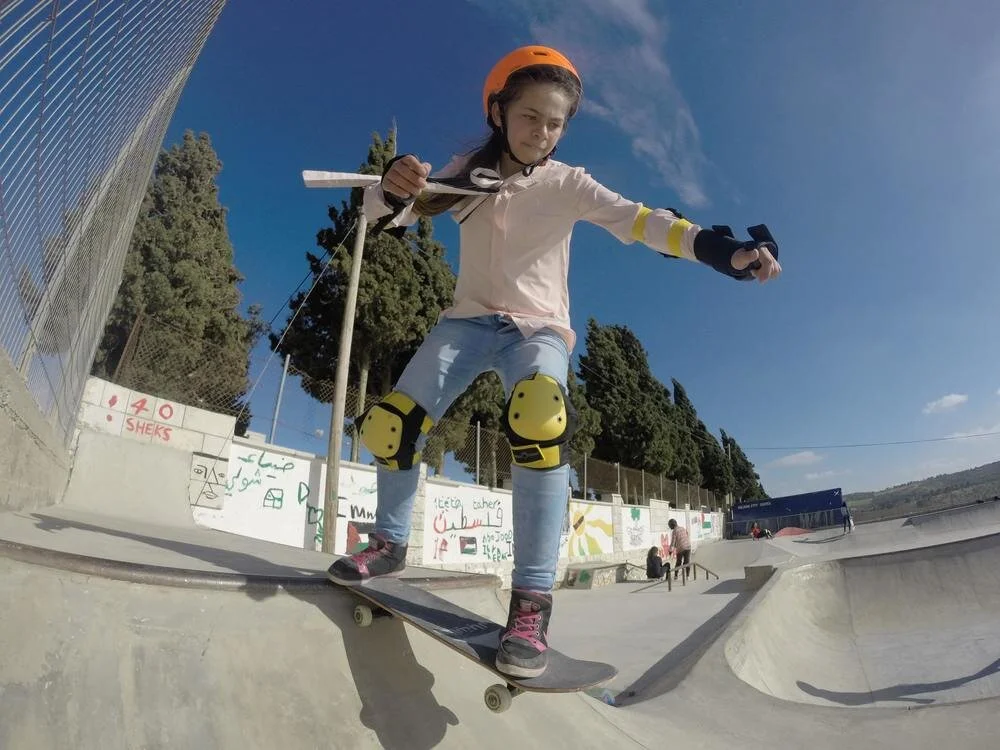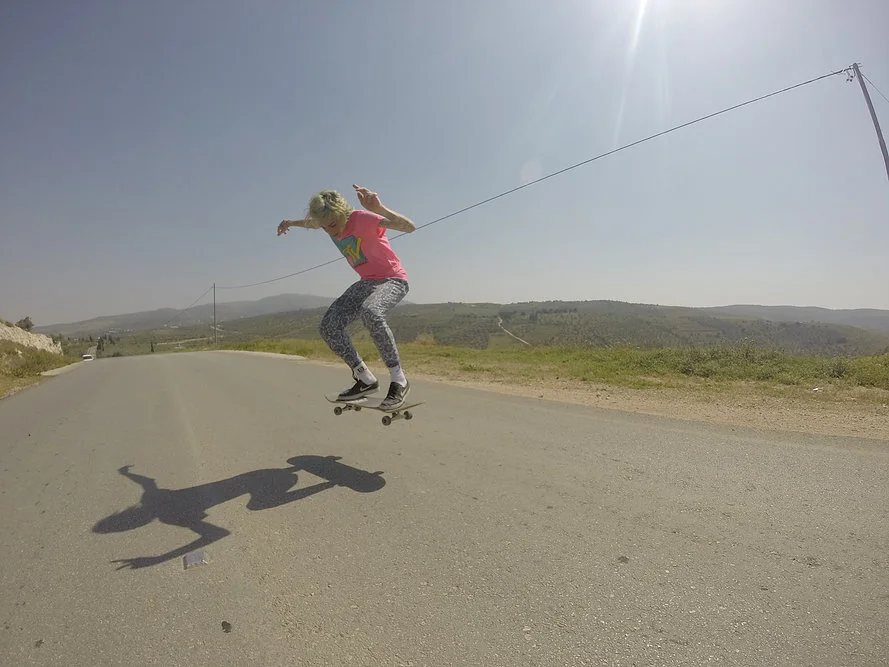Volunteer Interview: Rachael Sherlock & Rae Smith
We caught up with Rachael and Rae, two skaters from London who volunteered with us in early 2016 to teach at our skatepark in Asira Al-Shamaliya.
What made you want to volunteer with SkatePAL? How did you find out about the charity and how long did you come for on this trip?
Rachael: I first saw a video and interview with (previous SkatePAL volunteers) Lilly and Danni on the Girl Skate UK page and remember doing loads of research into what SkatePAL was. Then a few months later I saw a post looking for more female shredders. I’d always wanted to volunteer abroad and because this was skate related it made sense that I’d be more useful doing this than your bog standard teach English abroad placement.
Rae: Skateboarding has changed my life completely and now I want to give this life changing gift to as many other people as possible. I found out about the opportunity through Rachael - she told me she was planning on going and told me about SkatePAL needing more female volunteers. I was pretty nervous to apply because I've only been skating less than a year, so I was stoked to get accepted! I went for one month and I think I could have stayed for longer as it was such a rewarding experience and there was so much to do every day - it was awesome to form friendships and see people make real progress with skateboarding.
What were your preconceptions of Palestine before arriving? How much did you know about Israel / Palestine before arriving?
Rachael: I’d previously been to Jordan but this was very different. I thought poverty might be the main kind of problem, but this wasn’t the case.
Rae: I've been following the Israel/Palestine situation for years but always found it super confusing and complex. I'm a big believer in the idea that you can't really understand something until you've experienced it - and to be honest, even visiting the area isn't the same as living there, so I don't presume to have any real concept of what it's like for the people we met.
What I can say is that I've always wanted to help in whatever way I could, but didn't really know how. I was on the fringes of some activist groups for a while but it never felt like the right direction for me. Through skateboarding, just by doing what I love, I've been able to offer something in some small way without even trying, which is the raddest thing of all! I hope to continue doing what I love and I'll just see where it takes me, hopefully towards more positive and rewarding experiences like this :)
What was it like being the only female volunteers on the trip?
Rachael: It was actually alright. The first couple of weeks I was really nervous and careful not to offend anyone by wearing the right kind of clothes and trying to cover up tattoos etc. but towards the end I was much more comfortable and we’d made lots of friends who didn’t seem to care that we were different.
Rae: At first I was pretty nervous about it. I'd been to places before where I hadn't fully understood the culture and had accidentally offended people by showing my shoulders, for example. So we were really cautious over the first few days about how we dressed and acted. But as we got more comfortable we realised that the people had a good understanding of our culture being different to theirs and they didn't expect us to behave in the same way as them.
I mean we didn't go around wearing anything inappropriate but we didn't have to stress about covering our arms and ankles. I guess the only frustrating thing for me was not being able to do anything without someone else by my side - it meant that anything I wanted to do or anywhere I wanted to go I had to find someone else who also wanted to do that or go there. The good thing about this was that it helped us build empathy for the way that many women have to live.
How was it teaching the girls in Asira? What were the difficulties and successes?
Rachael: The main difficulty is that older girls are not allowed/ do not feel comfortable skating in the park with the boys. This poses the problem that for them to skate we need more female volunteers and more female only times. In the future I hope they can maybe set up a routine Girl’s Night like we have in London.
Rae: It was amazing. There were a lot of challenges - language barriers, lack of resources, clearing the park for girls only sessions, etc - but ultimately we overcame them all by just skating and having fun. The girls were strong, adventurous, confident and really hyped to be learning something fun and physical. I have a lot of hopes that skateboarding will be championed by the girls of Asira, that they will be inspired to fight for their right to skate as they grow older and that we'll see some awesome girl skaters coming our of their in the future - but for this to happen we really need more girls to go out there and encourage them :)
How did your ideas about Palestine change throughout the trip? What have you learnt?
Rachael: I’ve learnt a lot about the political history of Palestine, though I wouldn’t like to try and express these views to anyone as I tend to stay out of politics! I was also warned by so many people prior to the trip that Palestine is dangerous. But the people we met made us all feel very accepted and safe.
Rae: I guess I thought that poverty was going to be the biggest issue, but we had our eyes opened in some small way to many other issues that seemed be equal factors - like the isolation people experience when they aren't allowed to leave a place and how this prevents their culture from progressing with the times, the frustration it breeds and the lack of hope that begins to develop amongst the people. It's something we see in poor and deprived places in the UK too, when people are trapped and isolated by poverty. It felt strange to be able to relate that aspect of what we saw back to places in London in some way.
Meenas on the mini-ramp
Why do you think skateboarding is important for people in places like the West Bank?
Rachael: Children in Palestine are very vulnerable, in the sense that nothing good can come of the occupation, therefore, these children need something positive to keep them motivated. I think a huge benefit is not just the skating but the fact that SkatePAL volunteers come from all different parts of the world. I think it’s good for the children to be motivated to skate and learn about how to mix with different cultures and religions in a way that we do naturally in London.
Rae: I think it's important for so many reasons - I guess ultimately it's a tool but unlike most tools it doesn't have one specific purpose. The good thing about skating is that it's both social and personal - it's something that can be shared but at the same time each person takes from it what they need. For some of the people there it's a new love. Something they'll cherish their whole lives. For some it's a physical activity, which can be really empowering, especially for the girls who don't have a lot of opportunity do things like this. For some it's a psychological activity, a way to zone out of all the problems and issues that are going on and focus on something else for a few hours - which can be really therapeutic. Some will use it to form friendships around the world, and for others it's just something to do for a bit, which is still important when there is really very little else for them to do apart from work.
What's awesome to think about though is that these people are approaching skateboarding with an entirely new perspective and are being introduced to it in a unique way - so they could literally do anything they want with it, take it in new directions - the potential is amazing. Many people also told us that the skatepark is like a beacon of modernity in the town. It's inspiring people and giving them new ideas and new hope. They've already built a brand new children's play area right next to it and have plans for the whole area to be transformed. They've been talking about building a cinema and we've already seen women start to try it out as a legitimate activity for them to do too, which is super important.
Do you have any plans to come back with SkatePAL in the future?
Rachael: I’d love to come back as I really feel attached to a lot of the kids and would love to see them grow up! I might go out for a long weekend in late October/November if I have any holiday left at work.
Rae: I would love to but unfortunately I have no idea when I'll be able to. I have many of the people we met on Facebook and talk to them every day, and I really want to see how people have progressed and keep in touch with all the families who were so kind to us. Their hospitality made the whole trip so rad and we're so grateful!
What are you up to now, what are your plans for 2016?
Rachael: Back working full time at ITV. Hoping to help run some lessons down at southbank this summer with Like a Girl co.
Rae: Right now I'm back in London doing freelance art work and I might be moving to Vietnam to teach art for a year in August - so I'm kind of waiting to see what happens. Also trying to learn axle stalls.
So you're both part of the Nefarious crew (all female skate crew in London), tell us about that...
Rachael: Nefarious is great. It’s not about being the best skater. It’s about being a team, drinking, eating pizza, watching skate films etc. I recently broke my arm and if it wasn’t for Nefarious I would have instantly stopped skating despite the fact it makes me happy. Sometimes the views of other people, like my parents, make me feel embarrassed that I skate, because they don’t understand what it’s like to skate and what it does for me (keeps my brain and body healthy!). Nefarious gives me the strength and support I need to do something that I love and not be ashamed about my gender or age.
Rae: As Rachael said, it's something that gives us all confidence to skate and connect with other girls who love skating. Without Nefarious I wouldn't be skating at all, and I wouldn't have ever even found out about SkatePAL.
What would you say to other female skaters considering volunteering with SkatePAL?
Rachael: DO IT. The girls are buzzing to be able to skate but they need female representatives in the park in order for most of them to be allowed to do it!
Rae: For me this is what skateboarding is all about. If you feel the same then definitely go as it will have a profound effect on your life and on theirs.
Anything else you'd like to add?
Rachael: Many thanks to Charlie and SkatePAL for the opportunity, to all our fundraisers for making the trip possible and to my bosses at Good Morning Britain for organising my time off! x
Rae: I'd like to say to anyone who thinks they might not be a good enough skater to do this, that I think it's actually kind of awesome to go there and be a beginner. A lot of the kids and adults too responded really well to watching me fail at things and learn things with them - it gave them a sense that this was something they could learn and progress at and they were super hyped when they learnt something quicker than I did and they got to teach it to me!
Also a huge thanks to everyone who supported our trip and took an interest in what we were doing :)
Thanks guys!
Find out more about the Nefarious crew over at their Facebook page.
Check out Rae's website over at
If you're interested in volunteering send us an email.



